Events and Activities
Barbara Holthus interviewed about 3.11 by German newspaper
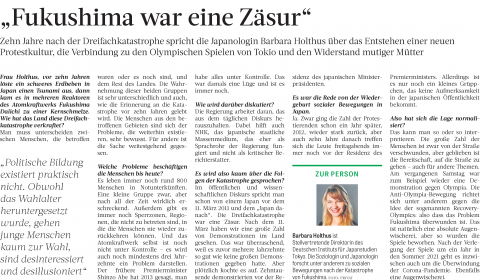
The German newspaper Frankfurter Rundschau has interviewed DIJ deputy director Barbara Holthus about the continuing effects of the ‘triple disaster’ on Japanese society. In “Fukushima war eine Zäsur” (Fukushima was a watershed), Barbara explains how 3.11 has caused the rebirth of social movements in Japan, increased mistrust of the Japanese government and of mainstream media, and also influences the critical attitude of many Japanese towards the Tokyo Olympics. “The anti-Olympics movement is directed, among other things, against the idea of the so-called Recovery Olympics: that the problem of Fukushima has been overcome. Of course, this is absolute eyewash, but that’s how the Games were advertised”. Barbara’s current research includes projects on Social movements and gender in post-3.11 Japan and a special project on the Tokyo Olympics. The newspaper article appeared online and in the FR‘s print edition on March 10. A collection of DIJ research and publications related to 3.11 is available here.
Wir suchen Verstärkung in Wissenschaft und Verwaltung
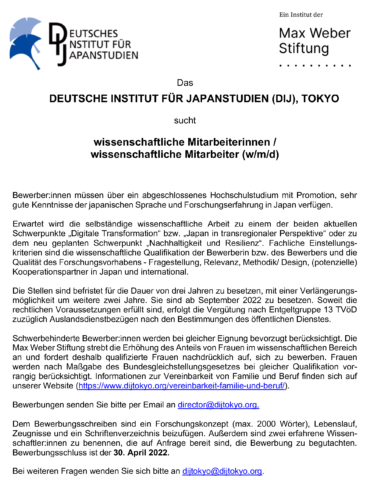 Das DIJ sucht wissenschaftliche Mitarbeiterinnen/Mitarbeiter (w/m/d) mit einem abgeschlossenen Hochschulstudium mit Promotion, sehr guten Kenntnissen der japanischen Sprache und Forschungserfahrung in Japan. Erwartet wird die selbständige wissenschaftliche Arbeit zu einem der beiden aktuellen Schwerpunkte „Digitale Transformation“ bzw. „Japan in transregionaler Perspektive“ oder zu dem neu geplanten Schwerpunkt „Nachhaltigkeit und Resilienz“. Die Stellen sind ab September 2022 zu besetzen, Bewerbungsfrist ist der 30. April 2022. Die Ausschreibung und Details finden Sie hier. Außerdem suchen wir möglichst ab 1. September, spätestens aber zum 1. November 2022, zwei Kolleginnen/Kollegen (w/m/d) in der Verwaltung. Bewerbungsfrist ist der 30. April.
Das DIJ sucht wissenschaftliche Mitarbeiterinnen/Mitarbeiter (w/m/d) mit einem abgeschlossenen Hochschulstudium mit Promotion, sehr guten Kenntnissen der japanischen Sprache und Forschungserfahrung in Japan. Erwartet wird die selbständige wissenschaftliche Arbeit zu einem der beiden aktuellen Schwerpunkte „Digitale Transformation“ bzw. „Japan in transregionaler Perspektive“ oder zu dem neu geplanten Schwerpunkt „Nachhaltigkeit und Resilienz“. Die Stellen sind ab September 2022 zu besetzen, Bewerbungsfrist ist der 30. April 2022. Die Ausschreibung und Details finden Sie hier. Außerdem suchen wir möglichst ab 1. September, spätestens aber zum 1. November 2022, zwei Kolleginnen/Kollegen (w/m/d) in der Verwaltung. Bewerbungsfrist ist der 30. April.
Virtual lecture on ‘Love in the Time of COVID-19’
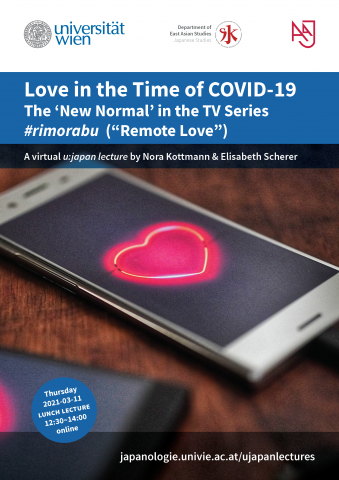
DIJ researcher Nora Kottmann and DIJ alumna Elisabeth Scherer (Heinrich Heine University Düsseldorf) will be the next speakers in the virtual lecture series at the University of Vienna’s Japanese Studies programme. Their presentation “Love in the Time of COVID-19. The ‘New Normal’ in the TV Series #rimorabu (‘Remote Love’)” focuses on the television series #rimorabu. Futsū no koi wa jadō which aired from October to December 2020 on NTV. The series is situated in the context of the ongoing pandemic and discusses how calls for self-restraint and the avoidance of ‘the 3Cs’ – closed spaces, crowds and close contact situations – affect the dating- and love-life of unmarried individuals. The presentation will address challenges on the production side and critically discuss depictions of a ‘new normal’ in the context of current single- and gender-discourses in Japan. More information on this talk and link to register here.
DIJ research presentation at ISA Forum of Sociology
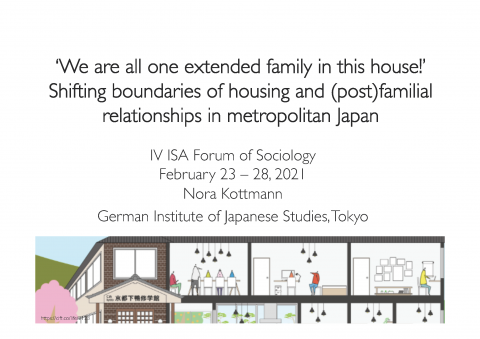
DIJ senior research fellow Nora Kottmann presented her paper “‘We Are All One Extended Family in This House!’ Shifting Boundaries of Housing and ‘(Post)Familial’ Relationships in Japan” at the virtual IV ISA Forum of Sociology on February 26, 2021. Her presentation was part of the panel “From the Changing Idea of ‘the Family’ to a Shifting Notion of Home?” which examined practices of doing family and home with foci on the temporal, spatial, material, and affective aspects of everyday life. Based on qualitative data from an ongoing field study in Tokyo, Nora’s paper addressed the interrelation of housing and ‘(post)familial’ relationships and the perception of dwelling spaces with regard to understandings of ‘family’. Her findings reveal that housing is highly interrelated with various ‘(post)familial’ relationships and that ‘new’ spaces are actively created and done by people living ‘new’ or rather unconventional relationships. Nora’s presentation was part of her ongoing research project on Spatial Perspectives on Personal Relationships in Contemporary Japan.
DIJ research presentations at “Sporting Japan” conference
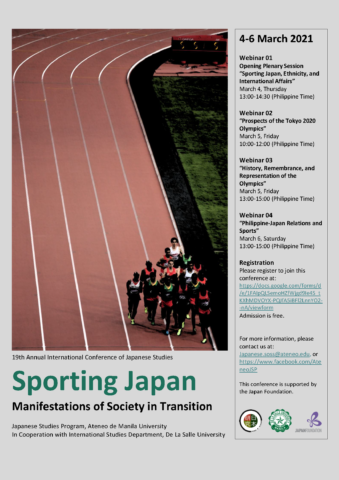 DIJ principal researchers Sonja Ganseforth and Torsten Weber have been invited by the Japanese Studies Program at Ateneo de Manila University to give research presentations at the 19th Annual International Conference of Japanese Studies. This year’s theme is “Sporting Japan: Manifestations of Society in Transition” and both will present papers related to their research on the Tokyo Olympics. Sonja’s paper “Spectacle and disaster – Opposition against the Tokyo 2020+1 ‘Recovery Games’” is part of the panel “Prospects of the Tokyo 2020 Olympics” (March 5, Friday, 11-13 JST). Torsten will give his paper “1940, 1964, 2020: Tokyo’s Olympic Pasts as Selective Memory, Nostalgia, and Denial” in the panel “History, Remembrance, and Representation of the Olympics” (March 5, Friday, 14-16 JST). Both papers draw on research Sonja and Torsten undertook for the DIJ’s special project on the Tokyo Olympics and the open access book publication Japan Through the Lens of the Tokyo Olympics. You can register for this online conference here.
DIJ principal researchers Sonja Ganseforth and Torsten Weber have been invited by the Japanese Studies Program at Ateneo de Manila University to give research presentations at the 19th Annual International Conference of Japanese Studies. This year’s theme is “Sporting Japan: Manifestations of Society in Transition” and both will present papers related to their research on the Tokyo Olympics. Sonja’s paper “Spectacle and disaster – Opposition against the Tokyo 2020+1 ‘Recovery Games’” is part of the panel “Prospects of the Tokyo 2020 Olympics” (March 5, Friday, 11-13 JST). Torsten will give his paper “1940, 1964, 2020: Tokyo’s Olympic Pasts as Selective Memory, Nostalgia, and Denial” in the panel “History, Remembrance, and Representation of the Olympics” (March 5, Friday, 14-16 JST). Both papers draw on research Sonja and Torsten undertook for the DIJ’s special project on the Tokyo Olympics and the open access book publication Japan Through the Lens of the Tokyo Olympics. You can register for this online conference here.
Election campaign film available on DIJ YouTube channel
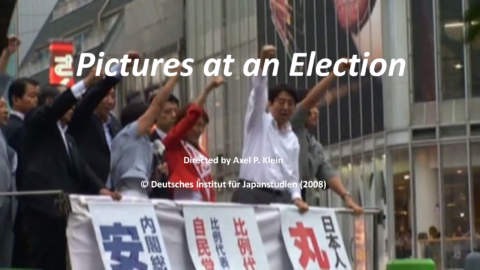 Pictures at an Election is a 68 min. documentary that shows Japan’s electoral machinery in full steam and focuses on the question of how Japanese candidates try to appeal to voters. It depicts different strategies and techniques, and presents a lively picture of political culture in Japan. It was filmed by political scientist and then DIJ senior research fellow Axel Klein (now Duisburg-Essen University, Germany) during the electoral campaigning in July 2007. Until today the documentary has been distributed for free to more than 100 universities all over the world. Since the pandemic has made on campus teaching impossible and online access to teaching material has become indispensable, the DIJ and Axel Klein have decided to publish the documentary on the DIJ’s YouTube channel. Coincidentally, the (unintended) protagonist of the documentary, Marukawa Tamayo, became Minister in charge of Women’s Empowerment and Gender Equality and Minister of State for the Tokyo Olympic and Paralympic Games in February 2021. This documentary shows how she started her political career with her first election campaign. Details
Pictures at an Election is a 68 min. documentary that shows Japan’s electoral machinery in full steam and focuses on the question of how Japanese candidates try to appeal to voters. It depicts different strategies and techniques, and presents a lively picture of political culture in Japan. It was filmed by political scientist and then DIJ senior research fellow Axel Klein (now Duisburg-Essen University, Germany) during the electoral campaigning in July 2007. Until today the documentary has been distributed for free to more than 100 universities all over the world. Since the pandemic has made on campus teaching impossible and online access to teaching material has become indispensable, the DIJ and Axel Klein have decided to publish the documentary on the DIJ’s YouTube channel. Coincidentally, the (unintended) protagonist of the documentary, Marukawa Tamayo, became Minister in charge of Women’s Empowerment and Gender Equality and Minister of State for the Tokyo Olympic and Paralympic Games in February 2021. This documentary shows how she started her political career with her first election campaign. Details
Torsten Weber quoted in Süddeutsche Zeitung article on Japanese history textbooks
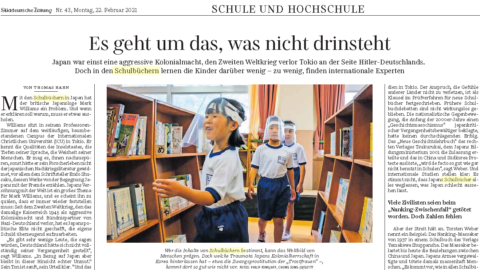
DIJ historian Torsten Weber was interviewed by the German daily Süddeutsche Zeitung for an article on the debate about history textbooks in Japan. Torsten explains that due to the so-called “neighbouring country clause” the majority of Japanese history textbooks presented a mainstream and relatively well-balanced narrative of Japanese imperialism and war-time aggression. The main objective of the textbooks was to prepare for entry exams. Consequently, they focused on teaching facts, causal relations, and omitted interpretations and controversial statements. Torsten gives the example of the Nanjing atrocities which are explicitly mentioned in the textbooks, including the victimization of Chinese civilians by the Japanese military. However, they avoided giving a number of victims as this remains a contested issue between the governments of Japan and the PR China. The article “Es geht um das, was nicht drinsteht” (It’s about what’s not in it) appeared in the print version of the SZ on 22 February and can be read online here.
DIJ researchers in Belgian and German media on Tokyo Olympics
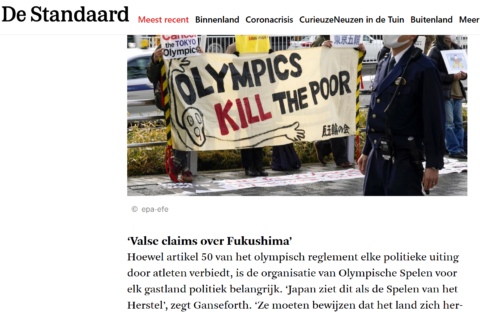
DIJ human geographer Sonja Ganseforth and historian Torsten Weber are quoted in newspaper articles in the Belgian daily De Standaard and the German weekly Die Zeit. Sonja comments on recent criticism in Japan of the Tokyo Olympics. “Activists have been criticizing the exorbitant spending and corruption in the run-up to the Games for years”, she is quoted in the article “Japanners vrezen dat Spelen zullen fungeren als superverspreider” (Japanese fear that Games may act as superspreader). “The expensive postponement due to the Covid crisis also leads to skepticism”, Sonja says. Torsten’s comments on how the Tokyo Olympics have become linked to promoting nationalism in Japan are quoted in “Olympia 2021 in Japan: Japans Nationalisten und ihr Plan mit den Spielen” (Japan’s nationalists and their plan with the Games). Their research on the impact of the 2020 Olympics on Japanese society is part of the DIJ’s special project on the Tokyo Olympics and the open access book publication Japan Through the Lens of the Tokyo Olympics.





 Open Access
Open Access
